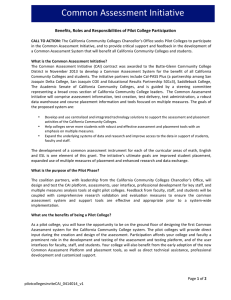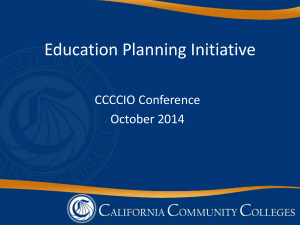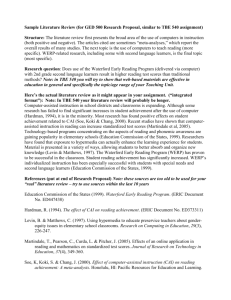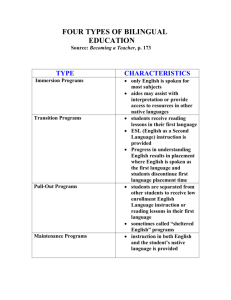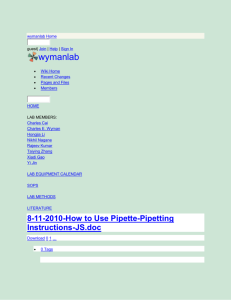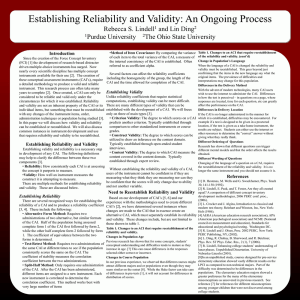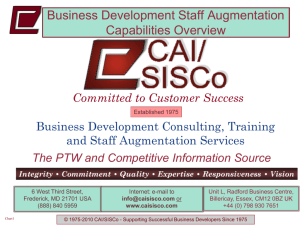Common Assessment Initiative Update
advertisement
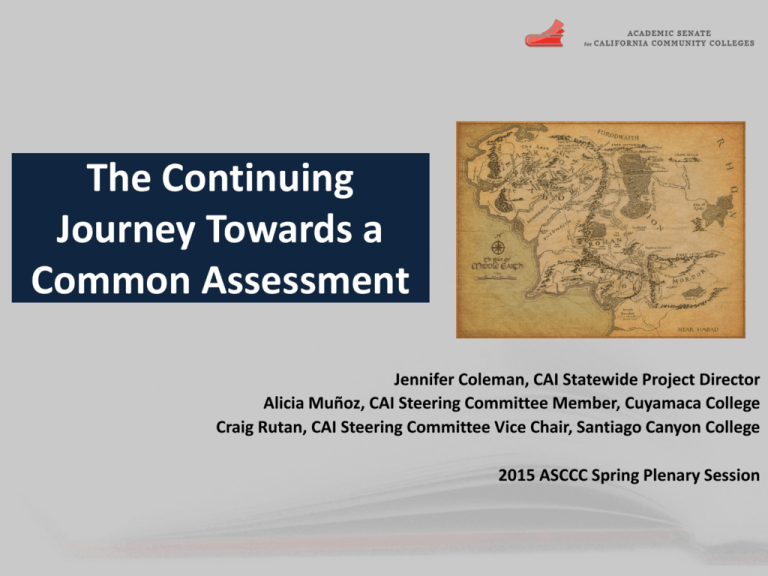
The Continuing Journey Towards a Common Assessment Jennifer Coleman, CAI Statewide Project Director Alicia Muñoz, CAI Steering Committee Member, Cuyamaca College Craig Rutan, CAI Steering Committee Vice Chair, Santiago Canyon College 2015 ASCCC Spring Plenary Session Overview • • • • • • • • Goals of CAI Work To Date for CAI CAI Workgroups Creating the Common Assessment Test Multiple Measures Pilot Phase Professional Development Future Timeline Student Success Task Force The Student Success Task Force looked at assessment, they found the current assessment structure to be inefficient for students and proposed recommendation 2.1: Community colleges will develop and implement a common centralized assessment for English reading and writing, mathematics, and ESL that can provide diagnostic information to inform curriculum development and student placement and that, over time, will be aligned with the K-12 Common Core State Standards (CCSS) and assessments. SB 1456 While you may be happy with your current assessment, your college must use the common assessment to receive SSSP funding (once available) The requirement that any district or college receiving funding pursuant to this section agree to implement this article, implement the board of governors’ system of common assessment, if using an assessment instrument for placement, and implement the board of governors’ accountability scorecard, pursuant to Section 84754.5, when established during the period in which it receives that funding. Goals of CAI • To develop a comprehensive, common assessment system that will: – align to state legislation – reduce unnecessary remediation – provide statewide efficiencies – effectively support faculty and staff to ensure accurate student placement, resulting in more successful student outcomes CAI Objectives • A fully adaptive test that covers – Math – English – English as a second language (ESL) • A Validated Collection of Multiple Measures Available to Colleges • Assessment Preparation (EPI/OEI) • Professional Development • Integrate data across the system Work Before Fall Plenary • Launch initiative project website – January 2014 – www.cccassess.org • Establish Governance – March 2014 – Stakeholder representation • • • • Environmental scan – May 2014 Pilot College Application and Selection – May 2014 Request For Information (RFI) – June 2014 Work Group formation and meetings – June 2014 Work Since Fall Plenary • Follow-up to Environmental Scan – Non-cognitive measures • Draft Competency Maps – Dissemination and Feedback • Request for Proposal (RFP) – Released to Vendors – Review of Responses from Vendors Vendors Selected • Vendor Selection – Unicon, Inc. – software development • Platform • Administration – Link Systems, Inc. (LSI) – World Wide Test Bank • English • Math • ESL CAI Workgroups • • • • • • • Math (includes above college-ready) English (includes Reading) ESL (includes Noncredit) Multiple Measures Professional Development Test Development Process Platform (User Interface, Reporting) Assessment Competencies • The competencies are designed to assess skills from basic skills courses. – Math: 4 Levels Below Transfer and transfer level math including College Algebra, Trigonometry, Calculus, and Statistics – English: 4 Levels Below Transfer – ESL: 8 Levels Below Transfer • The competencies do not distinguish between credit and noncredit • The competencies do not correspond to specific course levels. They simply include skills covered in those levels. Creating The Assessment Test • Step 1 – Convert assessment competencies into test specifications and test blueprints • Step 2 – Begin evaluating and creating test items to assess the skills in the competency maps • Step 3 – Have pilot colleges begin piloting test items and collecting data to determine any bias or disproportionate impact Faculty Developed Content • With the selection of LSI as the content partner, faculty developed test items can be incorporated into the common test • Items incorporated into the common assessment will belong to the CCCs and not LSI • Previously developed open source test items will be evaluated and added to the item banks as appropriate Hopes for the CAS • Provide diagnostic information about each student’s performance on the skills outlines in the competency maps • Colleges will use this new information to develop targeted ways of addressing skills deficiencies and help students transition to college level courses as quickly as possible Multiple Measures • Is there data that could be combined with the new Common Assessment to more effectively place students? • The Multiple Measures Assessment Project is looking at different types of data to evaluate how effectively student success can be predicted. • Possible data include: – High School GPA – Highest Level Math and English in High School – Years Since Completing High School – Scores on Smarter Balanced Assessments • The RP Group and the CAI Multiple Measures Workgroup are investigating different measures that could assist colleges with student placement Multiple Measures (2) • Environmental Scan Recommendations • Follow-up on Non-cognitive measures • Overlap with MMAP – Currently convening – Pilot college overlap • Additional research still to come Pilot Colleges • • • • • • Bakersfield College Butte College Chaffey College DeAnza College Delta College Diablo Valley College • Fresno City College • Rio Hondo College • Sacramento City College • Saddleback College • Santa Monica College • West Los Angeles College Pilot Phase • Two components – Test • Data collection and Validation – Technology/Platform • Student information system interface • Professional Development • Iterative process Professional Development • User types – IT/Software interface – Assessment Center staff – Faculty • Local control factors • Saddleback College as project lead • PD Advisory Committee over all three initiatives with ASCCC in lead role Professional Development Workgroup • Meetings begin in April and will continue meeting in the summer • Intensive training for pilot college faculty planned for September • Regional presentations about the common assessment being planned for late 2015/early 2016 Launch and Validation • Pilot Colleges then Early Adopters • External factors for phased implementation – Existing contracts – College resources • Ongoing support and continued validation Future Project Timeline • Summer/Fall 2015 – Begin test item piloting • Spring 2016 – Testlet Adaptive Field Testing – Feedback from the field – Development of resources for implementation • Fall 2016 – Release and Implementation – Ongoing feedback and development • Success! Are You Interested in Being Part of the Common Assessment Initiative? • The Common Assessment Initiative is always looking for faculty volunteers with backgrounds in assessment, placement, mathematics, English, ESL, and reading. If you are interested in serving on a CAI workgroup, please go to http://asccc.org/content/applicationstatewide-service and fill out an application to serve! Questions
